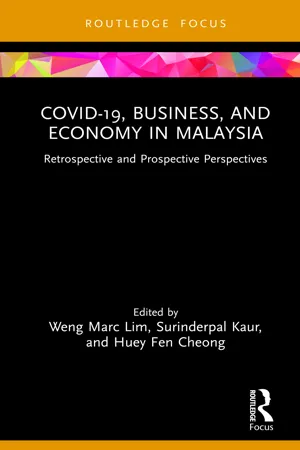1.1 Introduction
The coronavirus disease 2019 (COVID-19) is a pandemic like no other. In particular, the COVID-19 pandemic has exhausted economies around the world in addition to the public health crisis that it has created, taking away many lives and infecting and causing suffering to many more. The seminal article on the history, lessons, and ways forward from the COVD-19 pandemic by Lim (2021b) highlighted that the COVID-19 pandemic is unlike the Spanish flu, which infected a third of the world's population and took away the lives of up to 100 million people in the early 1900s. Specifically, Lim (2021b) indicated that the COVID-19 pandemic occurred in an era where globalization has matured, and disruptive Fourth Industrial Revolution (IR 4.0) technologies are omnipresent, leading to a mix of positive (e.g., solutions delivered at a greater pace, as seen through the pandemic and its vaccines emerging in the same year) and negative (e.g., damaging shocks on economic and public health) impacts.
Of particular interest in this chapter is the economic impact of the COVID-19 pandemic in Malaysia. In particular, the COVID-19 pandemic has led to massive lockdowns around the world, including Malaysia, and thus resulting in an initial pause and then a reconfiguration of economic activities. This unprecedented phenomenon can be encapsulated through a concept that the chapter coins as the quarantine economy. Here, the initial pause refers to the temporary industry shutdowns that economies across the globe encountered when COVID-19 was declared as a pandemic by the World Health Organization, and it was during this shutdown that governments around the world limited the opening of the economy to only the industries that provide essential goods (e.g., grocery retailers) and services (e.g., healthcare and logistics providers). The initial pause was nonetheless quick, as governments reopened the economies gradually with new social practices (e.g., remote work, physical distancing, visitor records) being enforced, thereby leading to a reconfiguration of how economic activities can be carried out during the pandemic.
In the academic and scientific landscape, the literature has not grown at a slower pace despite the COVID-19 pandemic. Instead, it has proliferated rapidly, as seen through the hundreds of thousands of search results that emerge from a Google Scholar search for “COVID-19” and “economy” in 2020, and thus indicating that the pandemic has largely served as an impetus rather than a barrier for new research. Yet, two shortcomings are apparent in the literature at the time of writing. First, research on COVID-19 and the economy, where business is prevalent, avail predominantly from the international perspective, as seen through the Web of Science review by Carracedo et al. (2021) and the Scopus review by Verma and Gustafsson (2020) on the topic in the Journal of Business Research. Though such a perspective is undeniably important, especially for theory development, its broad outlook may be too general to satisfy the appetite of stakeholders who wish to gain a contextual outlook, for example, a country-specific outlook (e.g., Malaysia). Second, though scarce research on COVID-19 and the economy relating to a country-specific outlook, particularly Malaysia, are available, they generally rely on piecemeal data (e.g., incomplete year) (e.g., Khalid, 2021; Lee et al., 2020). Though such research can be valuable for providing expeditious insights during the crisis, it cannot provide a stable evaluation of the crisis (e.g., a year-long perspective).
In line with the call by Lim and To (2021) to evaluate the economic impact of the COVID-19 pandemic using a year-long perspective, which they suggest is a pragmatic endeavour today given the availability of such data, this chapter aims to unpack the insights pertaining to the Malaysian economy in 2020, wherein the COVID-19 pandemic has had a significant impact. The insights presented herein are derived from secondary sources, which inform the critical review of the phenomenon under study. The outcome of this chapter is not meant to extend theory or result in novelty but rather to help readers gain a pragmatic understanding of the impact of the COVID-19 pandemic on the Malaysian economy. Such an understanding will also help readers to appreciate the subsequent chapters that focus on a variety of issues relating to business in the Malaysian economy as a result of the COVID-19 pandemic.
